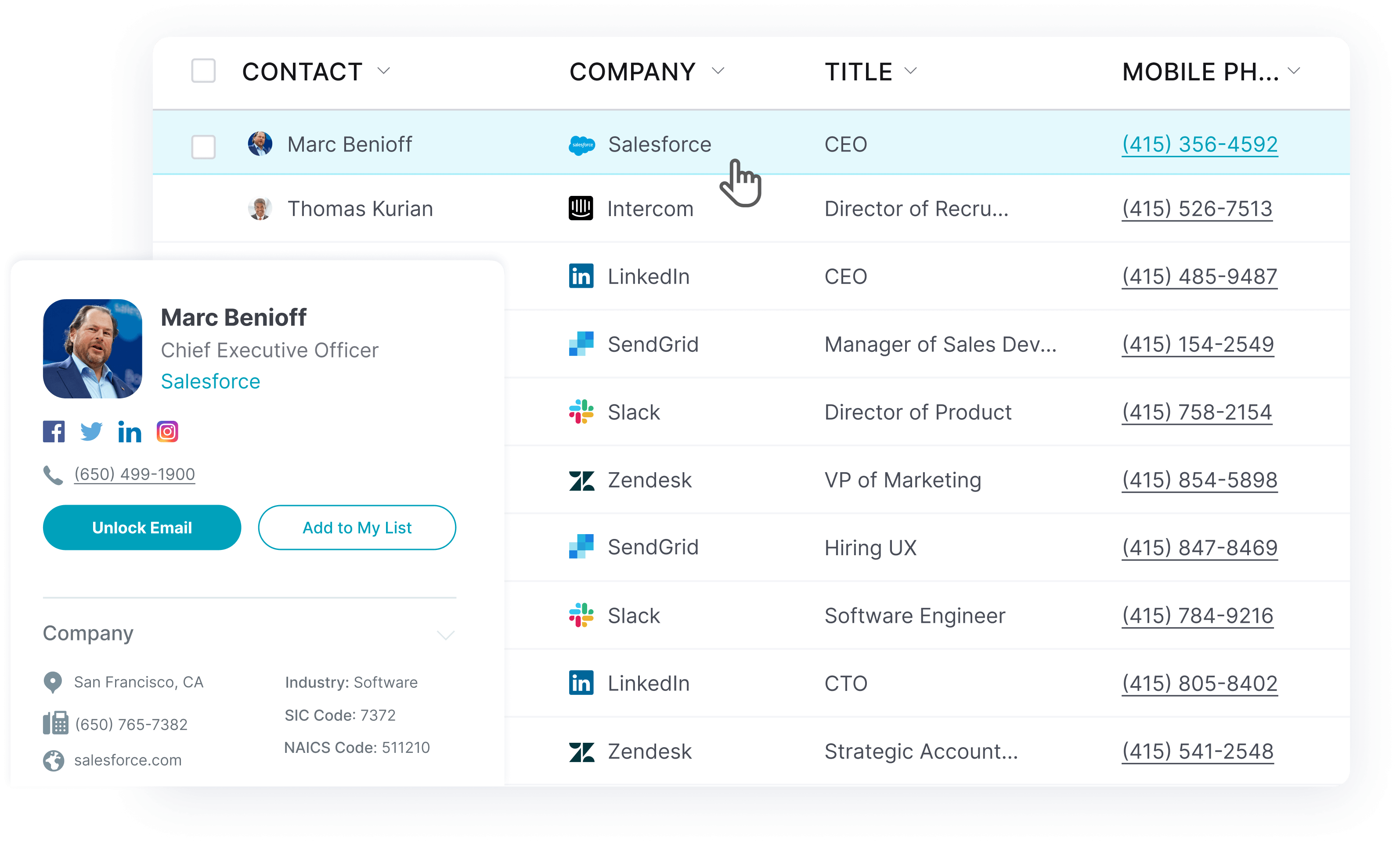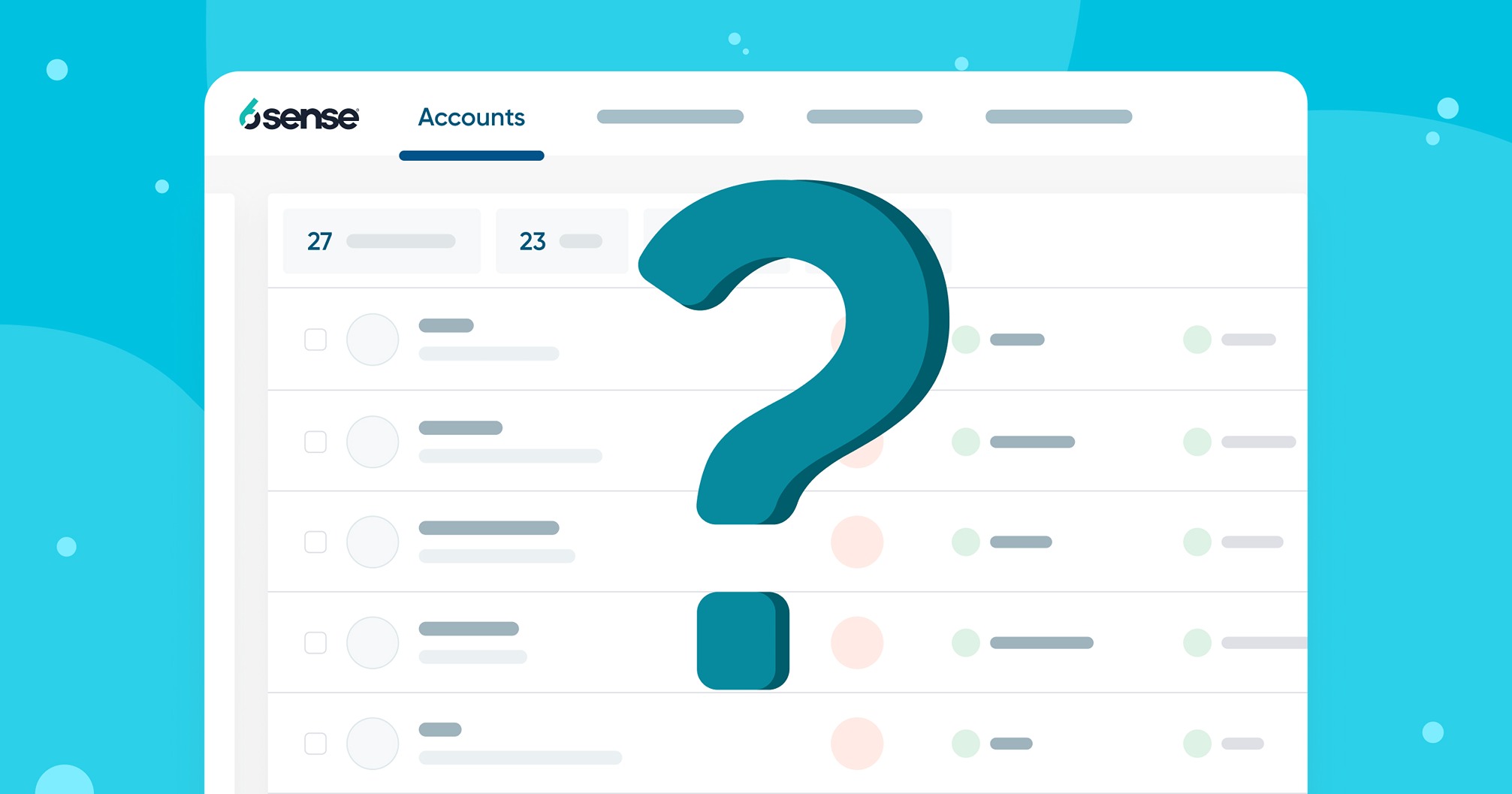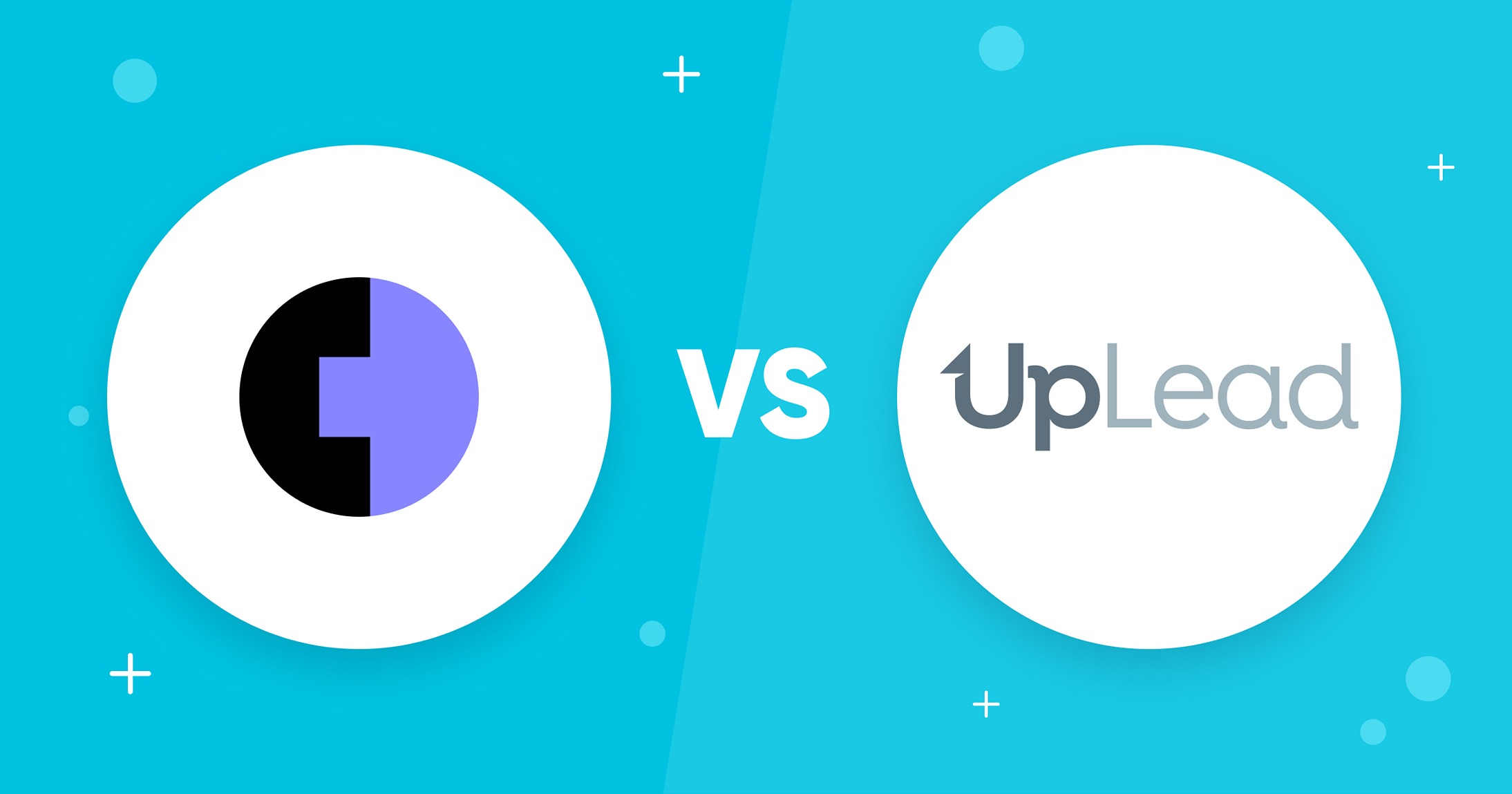In this article, we’ll go through everything you need to know about discovery calls and how to make them.
We’ll also go through:
- The best discovery call questions
- How to prepare for discovery calls
- How to make effective discovery calls
- Useful discovery call templates
By the end of the article, you’ll not only know everything you need to know about discovery calls but you’ll be equipped with the tools to improve your progress.
Let’s get started.
What Is a Discovery Call?
A discovery call is a conversation with a potential lead to qualify their purchase intent and capability.
Although this discovery process could be completed by email, it is always more effective to do it over the phone as this allows for proper conversational flow.
The discovery call intends to find out more about the potential lead, learn their pain points, goals, business information, budget, size, and needs, to figure out if the lead is the right fit for a product.
Discovery calls also allow the caller to add more information to the file about the lead. Even if the lead isn’t qualified to move to the next step, the saved data can be used to determine when the lead might qualify and when to follow up with them.
As you can see, discovery calls are vital to finding the right leads and reaching your sales quotas on time. To make a good discovery call, you need to ask the right questions.
Powerful Discovery Call Questions You Should Know
Here are the most important questions a caller can ask at each stage of the discovery call:
1. Setting the tone
When calling someone, remember that you’re interrupting their day. Your first goal should be to establish rapport with a friendly introduction.
To achieve this, use questions such as:
- How did you get into this industry?
- What do you like most about (your job/this industry/your location)?
- How’s the weather where you are? (when the lead’s location is different than the caller’s)
- Are you from (business location)?
- Do you like (interest related to their location or job)?
2. Qualifying the lead
Once you’ve created some rapport, it’s time to qualify the lead by using questions like:
- What’s the biggest challenge you face right now?
- What does your current process look like right now?
- What are your primary goals this year?
- Are you having issues with (main feature of your product)?
- What part of your job do you find the most challenging?
- Have you tried solving that problem so far?
- What would your ideal solution be?
- Why are you wanting to make this change now?
- Why are you interested in our product?
- If you could wave a wand to solve all of the issues in your process, what would that look like?
- If you don’t choose our product or any other similar product, what would you do to address your issue?
- What would the solution need to include for you to consider it?
- How would you see our solution fitting into your job process?
3. Getting ready to close the sale
Finally, you want to make sure you have everything you need before you take the last step. Get insights into all technicalities and potential future issues by using these questions:
- Do you have a checklist of the necessary criteria for choosing a solution? Who wrote that checklist?
- What issues do you think could arise if you were to use a solution such as ours?
- If you choose this solution, what sort of progress would you like to see a year from now?
- Have you purchased a solution like this one before?
- Who else is involved in the purchasing process?
- How can I help make this process easier for you?
These questions are to be used as a guideline rather than a manual. Use them as inspiration and adapt them to fit with your discovery process and your own style.
How to Get Into a Discovery Call (and What Makes a Good Discovery Call)?
Here’s how to ensure your discovery calls are consistently successful and effective:
1. Make sure the lead needs your product
This is the key piece of information you need when making a discovery call.
Someone who absolutely needs your solution will be more likely to bend around potential issues to make it work. However, selling your solution to someone who does not need it will only create a bad brand impression and will be more likely to prevent them from purchasing from you in the future.
Ideally, you should always ensure that your lead needs your product before you begin your discovery call and any form of product discovery. However, it’s not always this easy, especially when you’re lacking accurate information about your leads or a good method of visualizing the data.
Using a reliable sales intelligence tool like UpLead is an easy way to ensure you don’t waste time calling people who have no interest in your solution.
At UpLead, we not only give you access to over 160 million B2B contacts with email addresses, but we also guarantee a 95% accuracy rate on our data to ensure you’re not wasting your valuable time with unreliable information.
You can search our database by filtering through over 50 search filters, such as location, industry, sales software, and other online technology. All you need to do is to set the filters to your ideal client persona and let UpLead find them for you and provide you with the necessary information to contact them.
Once you find them, you can instantly visualize who they are and what they need through our vibrant profiles.
By using reliable technology, you’ll receive accurate data that will allow you to spend more time making discovery calls and less time searching for the right leads.
2. Make sure they know they need your product
You know they need your solution, but do they know they need it?
A great discovery call doesn’t just give you information, it also ensures the right leads know they need your solution.
That’s why setting up a friendly, casual tone is crucial in a discovery call. You can use the rapport you generate at the beginning to fully understand their problem and keep them open to a solution: your solution.
If, even after your best sales efforts, your lead still doesn’t see a need for your solution, they may not be a great fit for your product. When this happens, before you end the call, make sure they have all the information they need to reach you if they reconsider.
3. Make sure they can afford your solution
So, if you know they need your solution, and they know they need your solution, the next step to consider is whether they can afford it.
Before you get into the timing of how your solution would be implemented, you need to make sure they have the budget—or they can find the budget—to afford it.
To ensure your success, make sure they understand how your solution can improve their return on investment before talking to them about the budget. If they understand this, it makes your solution a more obvious decision for their business, and they will be more willing to increase their budget if they need to.
Once they do, you will still need to know if they can purchase your solution right away. Talk about how and when they see themselves implementing your solution, who will be in charge of it, and what their process should look like.
4. Make sure they buy your solution
Now that you have determined together that they need your solution and can afford it, how can you ensure they actually buy it?
You need to know all of the relevant stakeholders involved in making the decision. You need to speak with the key decision-maker. Ask them about what they would like to receive from your solution. Understand the potential hiccups that could arise later on in order to prepare for them.
Make sure you fully understand their purchasing process.
5 Discovery Call Best Practices to Generate More Hot Leads
Here are some research-proven tips to help you make effective discovery calls:
1. Get into the right mindset before every call
You may make discovery calls often, but they’re definitely not part of your lead’s routine. This is why making every phone call as fresh as the first one is vital to making the right first impression.
Before making a call, explore your lead’s profile. Try to paint a picture in your mind about who they are and why they do what they do. Try to find things the two of you may have in common.
Remember, this call isn’t about you saying all the good things you know about your solution. It’s about starting a conversation with someone, learning from them, and finding out how your solution can help them.
Make your lead a priority and ensure you see them as real people, rather than just another phone number.
2. Set your goals in advance
The goal of any discovery call is to get as much information from your lead as possible. That’s why you need to know exactly what you want to get out of the phone call before you even pick up the phone.
Create a checklist of your main goals to go through during the phone call to keep you on track. If you can, set up a phone appointment with your prospect so they know what to expect.
Finally, make a few notes about what to talk about at the beginning of the call to break the ice and set the right tone.
3. Ask the right questions at the right time
Sometimes it’s not so much about the question as it is about the way they’re asked. Get the most out of your conversation by choosing open-ended questions, asking them one at a time, and allowing your prospect to talk as much as they want to.
To get them in the right mindset to open up, start with easy questions and save the more elaborate ones for later.
Finally, for the best results, try to make your discovery calls early in the week between 3 and 5 P.M.
4. Prepare for all potential outcomes
Many things can happen when you’re in the middle of a discovery call, so preparation is essential. You don’t want to improvise an answer, but you also don’t want to sound like you’re following a script.
To achieve this, map out the potential outcomes of your call and have a few bullet points or general ideas about what to say, rather than writing a response word for word. This will allow you to adapt your conversation organically without reading lines.
5. End the call by setting the next call
One of the best ways to recognize if your conversation has been successful is if you are able to set a follow-up call with your prospect.
Try to gauge what time they would prefer to hear back from you and set a date to make it happen. Make sure you have all the information you need to make the next call, including confirming their contact information, appointment date, and time.
3 Discovery Call Templates and Scripts to Get Started (TODAY)
Here are a few templates and scripts to get you started:
1. Cold call script – Hubspot

Sometimes you can’t make an appointment for every phone call. That’s why you need to know how to handle cold calls and make them successful.
This cold call script by Hubspot is one of our favorites and can easily be adapted to become an effective discovery call.
2. Discovery Call Script Builder Template – Chorus
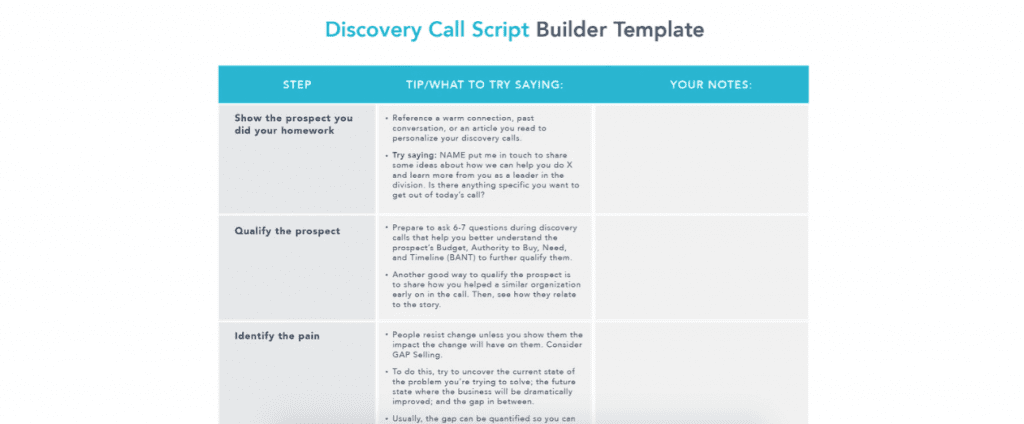
Looking to build your discovery call?
This free discovery call script builder by Chorus takes you step by step through the process to ensure your script is as effective as it can be. It guides you through an organic conversation flow and helps you gather the right information at each step to ensure you end each call successfully.
3. Interactive Discovery Call Questionnaire – JotForm
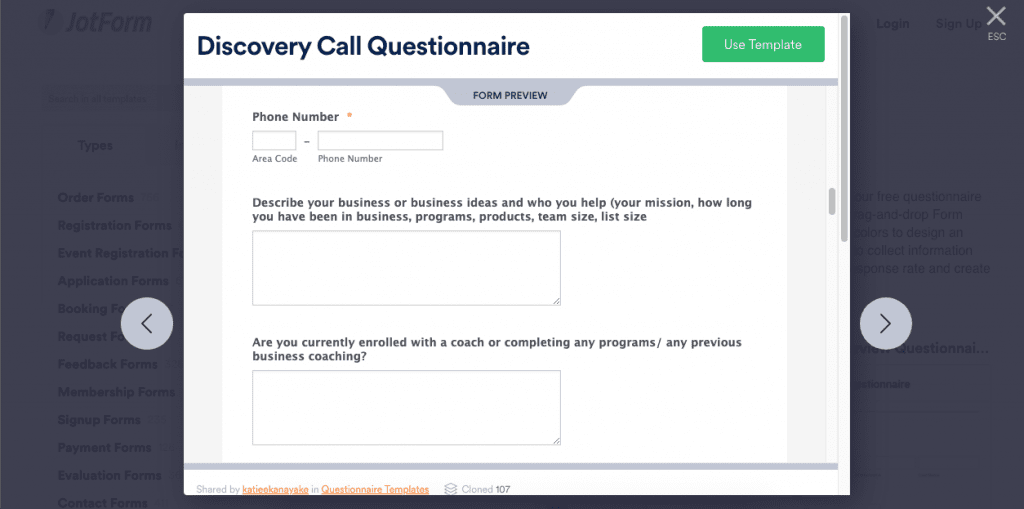
Organizing the information you receive is just as important as asking the right questions. This interactive discovery call questionnaire by JotForm allows you to set up the questions you need to ask and gives you the perfect place to save each answer so you can make sure all of the answers are properly documented.
Frequently Asked Questions About Discovery Calls
Here are some frequently asked questions when it comes to discovery calls.
Know who you are calling and why. Prepare your questions beforehand with your client in mind. Prepare for potential objections, and get yourself in the right mindset to listen.
It depends on the client and the product you’re selling. The more expensive the product and the more willing the lead, the longer the call will be.
A discovery call aims to find out if your leads are a good fit for your product by understanding their challenges, goals, and priorities.
A discovery conversation is a meeting or phone call with a potential customer to find out their challenges, goals, and needs.
A good discovery call is one that makes the lead comfortable and willing to answer questions from the start and exposes whether they are a good fit for your product or service.
Prepare for the call in advance, set up the right questions, make the other person feel comfortable, and allow the call to flow like a regular conversation.
Conclusion
Discovery calls are a key part of your sales process. To have successful discovery calls, make sure you keep a casual, friendly, and inquisitive tone. Don’t try to rush by bombarding your prospect with information, and don’t try to make the sale too soon.
And remember, if you want to ensure you’re calling the right people, you need to find the right leads. Try UpLead for free to start generating your leads today.
Lead generation doesn’t have to be all that painful. With UpLead, you can easily connect with high-quality prospects and leads to grow your company.
